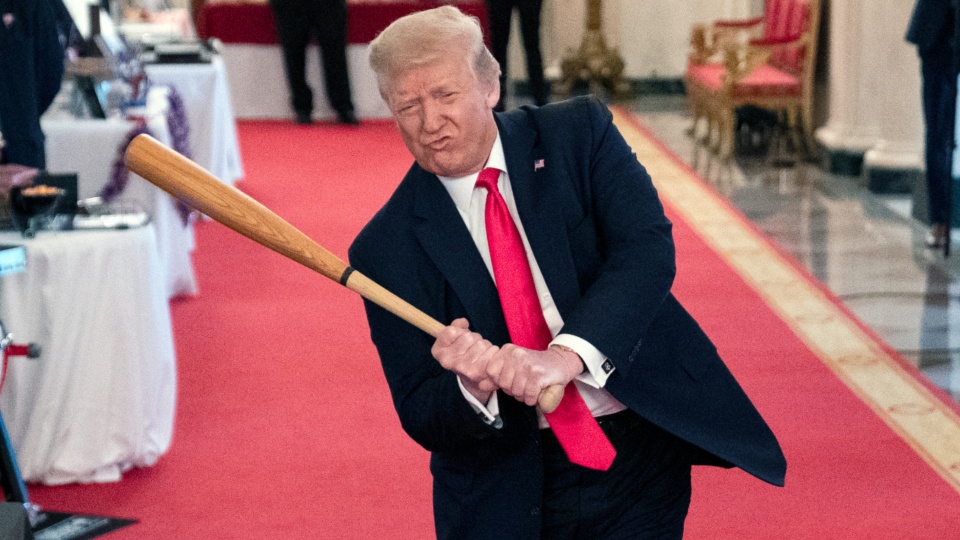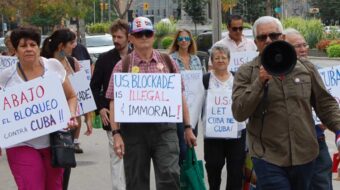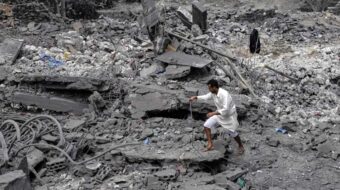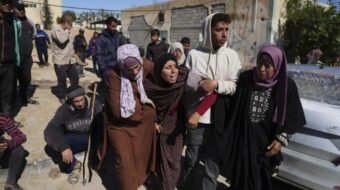
One of the most prominent figures in the early days of 20th century imperialism was U.S. President Theodore Roosevelt. Under his rule, the United States subjugated the Panama Canal Zone, occupied Cuba, invaded the Dominican Republic, and pursued an almost enless list of other acts of intimidation.
The president’s favorite saying, “Speak softly but carry a big stick and you will go far,” gave the name to the “Big Stick” policy. And Washington’s right to impose order abroad, which he defended, gave rise to the U.S. government’s image of itself as the “world’s policeman.”
Trump, who has assumed his second term as president, is a kind of reincarnation of Roosevelt. Without bothering with equivocations about democracy and freedom, he openly declares U.S. dominance. The new administration has demonstrated the seriousness of its intentions using the example of Latin America.
First targets: Cuba, Panama, Venezuela
On his first day in office, Trump returned Cuba to the list of “state sponsors of terrorism” (in addition to it, Iran, North Korea, and Syria are on the list). He declared that a detention center (read: prison) for 30,000 undocumented immigrants will be built at the U.S. military base in Guantanamo Bay, which Cuban authorities consider an illegally occupied part of their country.

Panama has also been targeted. “We will demand that the Panama Canal be returned to us in full, no questions asked,” Trump said, allowing for the use of military force. According to the president, Panama has violated its obligations by “handing over the canal to China.” This is a lie. Beijing’s involvement is limited to the fact that a Chinese firm won the tender to build a bridge across the canal, and the Hong Kong company Hutchison Ports has managed (but does not own!) two of the five ports located in the waterway area—Balboa and Cristobal.
It is obvious why Panama’s foreign policy has provoked the anger of the U.S. ruling class. In 2017, it severed diplomatic relations with Taiwan, established them with China, and joined the “One Belt, One Road” strategy. The same supposed “offense” is being charged on other “disobedient” countries. As Trump’s right-hand man, billionaire Elon Musk, claims, “Maduro is hurting the people of Venezuela just like his predecessor,” that is, Hugo Chavez.
The appointment of Marco Rubio as U.S. Secretary of State is another sign that the “Big Stick” will be brought down first on Latin America. A Cuban by birth, at the dawn of his career he claimed that his family had fled the “horrors of communism.” It soon became clear that the politician’s ancestors had emigrated to Miami quite legally long before the Cuban Revolution.
But Rubio’s flights of fancy are not always so harmless. In his lexicon, Venezuela is a “drug dictatorship,” Cuba is a “safe haven for terrorists,” and he accuses the Nicaraguan government of organizing human trafficking. And he asserts all of this without the slightest evidence.
Rubio’s first foreign tour took him to Guatemala, El Salvador, Costa Rica, the Dominican Republic, and Panama. The “catch” was rich. Panama announced its withdrawal from the “Belt and Road,” Guatemala agreed to accept U.S. military engineers to expand ports, and the U.S. will mine rare earth metals in the Dominican Republic.
In the style of slave traders
The “icy breath” of U.S. imperialism has also been felt by Colombia. In late January, a scandal erupted over the deportation of migrants from the United States. The practice is neither new nor unique to Trump; over the past five years, Colombia has received 475 deportation flights, including 124 last year alone. The Trump administration, however, has made significant adjustments. Migrants are taken out on military planes without prior approval from the receiving party. They are handcuffed and shackled throughout the flight, adults and children are not allowed to use the toilet, and there is no proper ventilation on the planes.
The first two planes sent from the U.S. were not accepted by Colombia. President Gustavo Petro called the humiliation of people’s dignity unacceptable, said his country is not a colony and that its people are not slaves.

A country like Colombia asserting its sovereignty caused hysteria in Washington. Calling Petro “a socialist without support among his people,” Trump announced the introduction of sanctions. Among them are 25% (with the prospect of increasing to 50%) duties on all Colombian goods. Bogotá responded with mirror measures.
“You consider us an inferior race. You can try to stage a coup with your economic might and arrogance, as you did with Allende, but you will not break our thirst for freedom. We do not need slave traders near Colombia. We have seen many of them and have gained freedom,” Petro said, referring to Salvador Allende, the president of Chile overthrown and murdered in a CIA-backed coup in 1973.
Unfortunately, the forces are unequal. Colombia agreed to accept the deportees, flying them out on its own planes, without humiliation or violence. However, the White House took credit for this. “America is respected again,” the White House arrogantly declared, threatening to revive its sanction threat if Colombia defies Trump again.
Colombia resists
The world should expect the Trump administration to act even more shamelessly from now on. This is facilitated by the lack of coordination even between progressive governments. An emergency summit of the Community of Latin American and Caribbean States (CELAC) was scheduled for Jan. 30. The initiative was taken by Honduras, which proposed discussing Washington’s actions. The meeting never took place; apart from Petro, none of the organization’s leaders confirmed their participation.
However, right-wing forces in those countries have perceived Trump’s return to power as a gift. For his attempts to defend his nation’s sovereignty, Petro was accused of “incompetence” and “irresponsibility” by the conservative opposition in Colombia. The latter will certainly not fail to redouble their attempts to overthrow his government.
Having retained the majority in parliament, they block progressive initiatives. In December, the opposition once again rejected Petro’s proposed tax reform, which envisaged an increase in tax rates on corporations. They’ve also refused to adopt the budget for 2025, trashing the president’s plans for “extra” spending in the social sphere.
Earlier, right-wing lawmakers rejected most of the president’s proposals for labor reform, including formal contracts and a minimum wage for agricultural workers, the right to organize in unions, collective bargaining, and strikes. “People who earn tens of millions of pesos do not want a daily worker to receive a minimum wage. That is why we are one of the most unequal and cruel countries in the world,” Petro commented at the time.
Despite all of these blockading efforts, the left has achieved a lot in Colombia. In 2023 alone, 1.6 million people were lifted out of poverty, and the extreme poverty rate fell from 14% to 11%. The opposition and big businesses threaten “reduced investment attractiveness,” but the government has increased the minimum wage every year. At the end of December, it rose from 1.3 to 1.42 million pesos (from $315 to $345 USD) an almost 10% jump, which is twice the rate of annual inflation. The government also managed to achieve the adoption of a pension reform that expands social security coverage by strengthening the state pension fund.
The opposition is also not happy with the foreign policy of Petro’s cabinet, which has severed diplomatic relations with Israel and restored them with Venezuela, refused to supply weapons to Ukraine, and recently announced its intention to join China’s Belt and Road Initiative.
Losing in a fair competition, the right is striking from behind. The National Electoral Council, made up of opposition supporters, has launched an investigation into financial irregularities allegedly committed by Petro and the left-wing Historical Pact coalition in the 2022 elections.
This move was protested by the Communist Party of Colombia, which is part of the government coalition (the Communists head the ministries of labor and agriculture). It filed a lawsuit against “biased, anti-democratic, and unconstitutional actions” that violate the will of millions of voters. According to the Communist Party, the opposition’s goal is to overthrow the government.
These assessments confirm the provocative attacks of the right-wing camp. At one of the rallies, former President Alvaro Uribe called for “international military intervention to overthrow the dictatorship in Venezuela.” The opposition accuses Petro of being unable to resolve the internal conflict. In January, fighting broke out between the guerrilla groups “National Liberation Army” (ELN) and “Frente 33” in the department of Northern Santander on the border with Venezuela. Dozens of people died, and 50,000 became refugees. The authorities announced the end of dialogue with ELN and began a military operation.
It is wrong, however, to think that the left is “going with the flow.” The organizations that are part of the “Historical Pact,” including the Communists, have announced their intention to create a united left-wing party and nominate a candidate for it in the 2026 elections.
Ecuador: Sacrificed to business?
In neighboring Ecuador, progressive forces have failed to reach a similar agreement.
On Feb. 9, presidential and parliamentary elections were held there, which became a continuation of a long electoral cycle. In 2023, former President Guillermo Lasso dissolved parliament under threat of impeachment and resigned. During the early voting, Daniel Noboa, a member of the richest business clan, won. It is difficult to imagine a president more alien to the country and its interests. Born in Miami, he studied at the New York University School of Business, Harvard, and George Washington University.
According to local law, Noboa was only allowed to complete Lasso’s term. To become a “full-fledged” ruler, he needs to win again, and he made every effort to do so. Noboa brazenly violated the constitution by refusing to take a vacation during the election and used administrative resources to indirectly fund his campaign. Noboa effectively removed his vice president, Victoria Abad, who was elected as his partner, sending her to Israel as an “ambassador of peace” with no clear tasks.
Secondly, Noboa has sidelined parliament, where he lacks support. He has issued decrees to abolish fuel subsidies and increase VAT on essential goods. The poverty rate has risen from 26% to 28%, and 58% of workers are informally employed—the highest number since 2007.
The president’s position was strengthened by the declaration of a state of emergency under the pretext of combating crime. According to the authorities, punitive measures have reduced the murder rate from 46 to 39 per 100,000 residents, but in some regions, such as Manabi, the situation has worsened.
The optimism of official reports is undermined by horrific facts. In December, the military, brought in to combat crime, detained four black boys aged 11 to 15, allegedly on suspicion of robbery. Sometime later, their half-burned bodies were found near a military base. Despite irrefutable evidence, the army leadership is threatening judges and the families of the dead children.
Noboa’s economic “achievements” are equally questionable. Ecuador has been gripped by an energy crisis, with power outages lasting 14 hours a day. The authorities blamed it on drought, although right-wing regimes had kept the industry “on a starvation diet” for years. Under the pretext of difficulties, officials talk about the need for privatization.
Lacking strong domestic support, Noboa relies on foreign patrons. In December, he bypassed parliament and violated the constitution (again) to legalize the presence of U.S. troops on the Galapagos Islands. The Pentagon is allowed to deploy weapons there, including combat aircraft and submarines, and to expand ports and airfields for its own needs. Throughout the country, the U.S. military is granted full immunity and freedom of movement. The formal reason is to help fight crime and drug trafficking.
Despite the blatant trading of the country’s interests, Noboa is leading after the first round of elections. As in 2023, his main rival is the candidate of the left-wing Citizens’ Revolution Party, Luisa González. Her platform includes measures to reduce inequality, increase public investment, and develop social programs. At the same time, González advocated for attracting private business to the energy sector and supported strengthening the powers of security forces.
The gap between the rivals is minimal, only 0.2% of the votes. Third place went to the candidate of the Indigenous party “Pachakutik,” Leonidas Isa, who ran on a socialist program. The second round is scheduled for April 13.

The parliamentary elections that took place simultaneously brought success to the left. The “Citizens’ Revolution,” “Pachakutik” and the Marxist-Leninist party “Popular Unity” together have 77 mandates out of 151. The fate of the country depends on whether they can reach an agreement.
Wielding the “Big Stick”
Latin America as a whole became one of the first international victim of Donald Trump’s aggressive policies. It joins China and others on the Washington’s updated target list. The new administration’s attacks on leftist governments south of its border have emboldened local reactions, but they have also yielded uneven and uncoordinated responses.
The opposition has raised its head in Colombia, seeking to aid Trump in his assaults on their country’s progressive government. The pro-U.S. regime in Ecuador, meanwhile, is trying to hold on to power by any means necessary.
Defying Trump and U.S. imperialism and preserving sovereignty in the region is going to require unity—much more of it than has been seen so far.
As with all news analysis articles published in People’s World, the views reflected here are those of the author. An earlier version of this article originally appeared in Pravda.
We hope you appreciated this article. At People’s World, we believe news and information should be free and accessible to all, but we need your help. Our journalism is free of corporate influence and paywalls because we are totally reader-supported. Only you, our readers and supporters, make this possible. If you enjoy reading People’s World and the stories we bring you, please support our work by donating or becoming a monthly sustainer today. Thank you!











